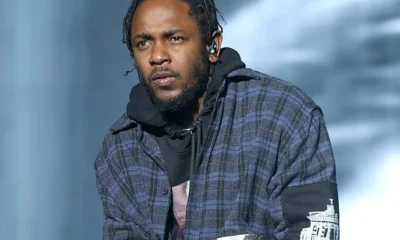NEWS
I’m Done Serving Nigeria –Okonjo-Iweala
Published
6 years agoon
By
Reporter
Former Minister of Finance, Ngozi Okonjo-Iweala, at an event preceding the signing of the book, ‘Fighting Corruption is Dangerous: The Story Behind the Headlines’ held at the Politics and Prose, Washington DC, which had in audience members of her family, friends, colleagues, international institutions representatives, disclosed why she wrote the book. She also read two portions from the book, to illustrate what she had to go through in the fight against corruption in Nigeria.
She also revealed how her bold move to confront a deadly group saved her from being confined to a wheelchair the rest of her life, just as she revealed how Christine Lagarde’s visit in December 2011, was almost marred by a top official in Jonathan’s government all in a bid to arm twist her to back down in implementing the presidential order to end Cargo Tracking Note, a transaction that was yielding $6 million annually but was not getting into government coffers.
Why did you to write the book?
When I set out to write, I knew I was going to write a book because I wanted to write a sequel to my first book. You may not have seen it, it is also from MIT Press called ‘Reforming the Unreformable: Lessons from Nigeria’. It captures public policy lessons from the first time that I was in government as finance minister and all the various reforms that were done with the economic team that I worked with under President Obasanjo at the time. It talks about our efforts to get debt relief etc but focused a lot on the macro economic reforms.
I thought after a second time in office I will be writing a volume two which will focus on reforms in the real sector – agriculture, telecommunications, and power. What exactly were the reforms we did in those sectors and what were the successes and failures. So, I actually set out to write volume two but when I sat down, what came out from my laptop was different. I found myself putting down the story of what happened to my mother. And that meant that somewhere deep inside … and as I was doing it I was very emotional, very upset and I realised how upset I was at what had happened and in many senses still I am.
So, I wrote that chapter and I showed it to my husband and he said, well, ‘you have to finish, why was she kidnapped?’ And that led to the next chapter and the rest is history. So I ended up writing a somewhat different book from what I had expected to write and it became this book about fighting corruption.
So, one of the reasons was a very personal account of what happened to me and the reasons why it happened and the stories about the different ways that people were trying to engender leakages within the economy just came out. And that became this book. So that was the first thing, to get out that story. As I was doing it, also all the explanations for the personal attacks and the other attacks I suffered during the time within and outside government, this came naturally as part of the flow.
Why did these things happened, it all began to make sense. I needed to make sense of it to myself, I needed to make sense of it to others, and I needed even to make sense of it to members of the economic team. And I am very, very happy that today we have Dr. Nwanze Okodegbe, right here. He was the Chief Economic Adviser to the president and he was a member of that team. We saw a lot of odd things together. So explanation as to why this thing happened, that is the first part.
The second was that there is just so much going on about corruption in emerging markets around. South Korea, you saw what happened to the president being jailed for 24 years. Brazil, there was so much noise about the car wash scandal. Venezuela, Mexico, Peru, Malaysia, you name it, so many examples of emerging markets countries having one discussion after the other about corruption. And as a development economist, you know this is something central to the work we do, something we worry about. And we just talked about fighting corruption and trying to make sure that resources that should go to eradicating poverty, providing services for poor people are not hijacked by those in society who would do that.
The third reason was just one of giving hope. When you hear about corruption there are rarely any success stories action, people don’t focus on those who are fighting corruption and what successes they made. They focus on more salacious aspects. How much people have stolen, how much they have and what is happening to them. And the tough fight that is really needed and the people who are doing it are not talked about.
In addition to that, there is the tendency to focus as I said on the more sexy aspects in terms of who was arrested, who did what to whom, how much did they steal and what is happening. But the tough, tough work of really wanting to fight corruption of institution building is not talked about. And I am very convinced as I have said to other audiences, that the difference between people in my country and other African countries or the US or Europe is much related. If they had the same weak institutions that we have, people will also put their hands on the money. It is because these countries have very strong institutions that you find fewer leakages. There is corruption everywhere, whether it is in Europe or the US but the degree is less with those countries with stronger institutions. That work of building stronger institutions takes time. And that was partly what we did in Nigeria, put down some few institutions that helped to block some leakages.
So I also wanted to put that down and draw people’s attention to the fact that it is the hard work that is needed, whether it is strengthening the judiciary, whether it is putting in place in the ministry of finance the kind of financial management systems that are needed in order to manage your finances in modern fashion that doesn’t allow leakages from the budget.
Can you tell us about the Christine Lagarde’s encounter?
About six weeks into the implementation in early December 2011, I received a message that a top ranking presidential aide wanted me to stop by his office any time I was in the Villa. The Villa is the equivalent of the White House. This official was one of the important aides in the Villa. So, I went to his office the next day. The presidential aide told me that he wanted to convey a message to me that they were people not happy with the port reforms especially the abolishment of the Cargo Tracking Note. And he asked me, indeed advised me to reinstate it. I was dismayed because the fact that the matter has been brought to his attention meant that whoever the unhappy people were, they were influential. I explained the genesis of the port reforms, the situation of the presidential task force and the approvals for action given by the president. By implementing the reforms measures we were just carrying out the presidential approvals. He said he understood but that I should nevertheless find away to reinstate the Cargo Tracking Note.
I left his office very troubled. Being on the wrong side of people who had this kind of top levels influence made me uneasy. I knew they could be consequences but I also knew that there was no going back on these important reforms. Clearly the $6 million from the Nigerian Ports Authority from the Cargo Tracking Note not being remitted to the treasury must be going into some influential pockets.
The morning after meeting with the presidential aide, the consequences began to become clear. I was privileged that part of my daily routine was to join the president and his family and his few close friends in Christian fellowship and morning prayers in the residential complex of the Villa. It was a way to gain strength for each difficult day. The prayer normally began at 6am so by 5:45am every day, I arrived at the Villa gate I was routinely waved in. That morning the gates remained firmly shot as I drove up and I was told I could not go in. Taken back I asked why, all I could get as a response was that the gate keepers had received instructions not to let me in for morning prayers. I began to argue but realizing that it was fruitless, I returned home. At that point I felt a mistake had occurred and thought no more about it.
But for the next three days I was blocked from entering for the early morning prayers at the Villa. By the third day, the security officers at the gate all of whom knew me well told me, ‘Honourable Minister Ma, I think you need to talk to the presidential aide, ‘they gave me the name of the aide and it was the same person who had asked me to restore the Cargo Tracking Note. Then I understood. When I called one of my prayer fellowship friends on phone, Mr. John Kenny Opara and told him about the situation, he said he would discuss this with the villa pastor and they will intercede on my behalf.
After going to the gate and not allowed in for the fourth time, I pushed the situation to the back of my mind and turned to the preparations for the upcoming visit to Nigeria of the Managing Director of the International Monetary Fund, Madame Christian Lagarde, on December 18-20, 2011. My biggest preoccupation was to ensure that in the raging national debate about the phase out of oil subsidies, Madame Lagarde’s visit was not miscast by the media or anti-government forces as the IMF telling the government what to do on energy subsidies. Madame Lagarde, was equally concerned that her objectives be clearly understood as reviewing our macroeconomic and growth reform and offering encouragement and support.
The visit proceeded smoothly as Madame Lagarde met with members of the Economic Management Team, the Central Bank and other important bank officials. She was scheduled to meet with the president on the final day of her visit December 20. There are usually many protocols and conventions to observe on high level visits especially when the visitor is accorded head of state’s status as Christine Lagarde was. One of these is for such dignitaries to enter the Villa for a meeting with the president through a gate designated for Heads of State only. Because Madame Lagarde was to use this gate, I had asked my staff to double check and ensure all was in order and I was reassured that this was the case.
But when the motorcade reached this gate it was denied entry. Embarrassed, I tried to find out from the security guards what was going on; they said they had no instructions for her to use that gate. And we should proceed to the entrance reserved for state governors, certain designated ministers I was one of them and other dignitaries. We were already running late. So I apologised to Madame Lagarde and told her there must be a mix up and asked the drivers to proceed to the other gate. When we got there we were again denied entry. By this time it was clear to me that there was no misunderstanding but that this was deliberate. We were told to go back to the regular entrance used by everybody, park our car there and we will have to walk, five minutes down the villa corridors which were long and leading to the president’s meeting room.
Such treatment of such dignatory at the level of head of state was unheard of. Christine, clever as she is had figured out something was wrong but she didn’t know what. She handled it all with gaits and elegance telling me she didn’t really care which gate she went through or how far she had to walk as long as we met with the president. By this time we were about 10 minutes late. We eventually made it to the meeting. When the president enquired if everything was alright, she replied wittily, Mr. President there was a bit of a mix up about gates and we had to walk here. But it gives me the chance to see your beautiful Villa and its lovely gardens. The President looked puzzled but smiled and started the meeting. I never shared with him or with Christine Lagarde what I thought had happened that day.
It shocks me to this day that the gate saga as I later described it to John Kennedy, my prayer meeting friend, was part of the fall out of eliminating the Cargo Tracking Note. It still seems unbelievable that people will put at risk such a high level and important visit for the country’s economy because of personal interest. John Kennedy and the Villa pastor eventually persuaded the top presidential aide to drop this tactics by explaining to him that such tactics could backfire if one day the president summons me for an emergency meeting as he was wont to do and I was prevented from entering the villa and had to tell him why. Eventually, the pressure from the abolition of the Cargo Tracking Note lessened but I remained uneasy until the end of the administration.
But one of the reasons I wrote this book as I said is also to give hope and for the younger people to know that there are actually things you can do that will block corruption. That if we can build all of those institutions and we did at that time, and if you can take a stand that you can have victories that will illustrate that we shouldn’t all give up, we can make it.
What are the lessons?
There are several lessons that I think we should take away from the book. One of the most important ones and I call them reflections from the frontline is that, in fighting corruption, corruption has to be fought from inside not outside. Outsiders cannot fight it. Outsiders can help – donors, country partners and others have a role to play but they can only play a supporting role, they have to find partners from inside, who know exactly how the place works and how it can be fought. You can’t also fight alone, you need coalitions of support, and it is not one person.
People tend to say Okonjo-Iweala fought corruption, no. There were teams, there were members, and you need coalitions. I had people on my ministry, I had people in the economic team, and I had others. You need support from above in other to make it work. You need communications and signalling that this is not the right way a place should run and that you are going to do something about it. And you need your personal integrity if you are to going to fight this kind of corruption, you absolutely yourself and your team must keep your noise clean and your head straights because if you even deviate one iota, they will get you and you will be punished for it. You have got to have a talk with those working with you; you have got to have a lot of personal integrity.
And those fighting needs help. Is not good enough to stay out here as development partners and practitioners and urged the fight against corruption. I’m lucky because I had options, I had people who supported, I had a place to go. I am very grateful to the international community for the support they gave and for those within the continent who also reached out. There were several heads of states that were supportive. But what if no one knows you? What if you don’t have a track record outside? What if you had nowhere to go? This is what the development community must think about. If you want people to fight corruption they need to feel the support and they need safety nets, they need to be able to come out if necessary and have a place to go to and resources to support them. So I am advocating that some of the foundations, some of the institutions should think about starting a fund.
I know that when Nuhu Ribadu at the time that his tenure at the EFCC had finished, he needed somewhere to go when things were not so easy for him. There was no money, no support. I was at the World Bank then as managing director and together with Todd Moss of the Center for Global Development and others, we got together and we manage to get the Norwegians to put money for 18 months to support Nuhu and his family and they gave him a place at Center for Global Development. He was able to bring out his wife and children and they were able to live for 18 months and by that time things had calm down and he was able to go home again.
And then Detongo from Kenya, it was only when friends at Oxford University in England arranged something for him that he was able to have support. But these are adhoc measures and I want us to think of some kind of more permanent supportive system that can encourage people who are really putting themselves on the line to stay steadfast and fight corruption. There is a movement and people are interested in doing this, so let’s see how it goes.

Popular Nigerian musician Portable is facing legal trouble over an unpaid debt. The singer is known for his sometimes controversial persona. The drama centres around a high-end purchase: a G-Wagon he bought from a car dealer.
According to news reports, Portable purchased the luxury car for a hefty ₦27 million but only paid ₦13 million upfront. This left a remaining balance of ₦14 million. The car dealer reportedly tried contacting Portable to collect the remaining sum. The musician allegedly kept claiming the vehicle had mechanical problems as a way to avoid paying. Unwilling to accept these excuses any longer, the car dealer decided to take a firmer stance and report the matter to the authorities.
On Tuesday, May 14, 2024, the Lagos State Police confirmed Portable’s arrest. Police spokesperson Benjamin Hundeyin stated that the musician was arrested specifically for defaulting on his G-Wagon payment.
“Yes, Portable has been arrested. He bought G-Wagon for ₦27m, paid ₦13m, and refused to pay the rest, claiming the vehicle was bad. We arrested him today,” Hundeyin confirmed.
This incident adds another chapter to Portable’s already colourful public image. It remains to be seen how this situation will be resolved and whether it will impact his musical career.
MUSIC
Kendrick Lamar’s “Not Like Us” Beats Drake’s “Family Matters” To Billboard #1 Spot
Published
1 day agoon
May 14, 2024By
Reporter
Kendrick Lamar‘s latest diss track, “Not Like Us,” has landed the coveted number-one spot on the Billboard Hot 100 chart. This marks Kendrick’s second chart-topping single in 2024, following the success of “Like That” by Metro Booming & Future.
“Not Like Us” is the final chapter in Kendrick’s rap battle with Drake, and many fans believe it solidified his victory. This track, which Mustard produced, completely outshines Drake’s response song, “Family Matters.” “Family Matters” debuted at a much lower number 7 on the Billboard Hot 100.
Billboard Hot 100: #1(new) Not Like Us, @kendricklamar.
— chart data (@chartdata) May 13, 2024
Here’s where things get interesting:
Kendrick’s entire diss track trilogy dominated the top 10. “Euphoria” climbed eight spots to number 3, and “Like That” (by Metro Booming & Future) rose two places to number 2.
“Not Like Us” also shattered records on its path to the top. It became the most-streamed rap song on Spotify in the US in a single day, and it nearly broke Drake’s global single-day record for a rap song on Spotify (held by “Girls Want Girls” featuring Lil Baby).
Sales-wise, “Not Like Us” boasted the biggest debut week for any song in 2024, with 510,000 units sold. It fell short only to Taylor Swift’s “Fortnight,” which debuted with 560,000 units.
Biggest song debut sales weeks of 2024 so far (US units):
#1 Fortnight 560K
#2 Not Like Us 510K
#3 Like That 455K
#4 Down Bad 385K
#5 I Can Do It With A Broken Heart 340K
#6 The Tortured Poets Department 340K
#7 So Long, London 335K
#8 My Boy Only Breaks His Favorite Toys 325K…— chart data (@chartdata) May 13, 2024
This chart dominance by Kendrick Lamar’s diss tracks proves that the music, not just the feud, resonated with listeners. “Not Like Us” not only secured the number one spot but also propelled his other diss tracks up the Billboard Hot 100, solidifying his success in this musical battle.
MUSIC
BNXN Bags His First RIAA Certification With “Mood”
Published
2 days agoon
May 13, 2024By
Reporter
Nigerian music star BNXN (formerly Buju) is on a roll with the hit song “Mood.” It just hit a major milestone in the US music industry.
Remember “Mood”? “Mood” the catchy track BNXN collaborated on with Wizkid for his critically acclaimed album “Made In Lagos (Deluxe Edition).” Well, “Mood” has just been certified gold by the RIAA!
This might sound complex, but here’s the scoop:
The Gold Standard
The RIAA, or Recording Industry Association of America, is a big deal in the US music world. When a song or album earns a Gold or Platinum record from the RIAA, it means it’s achieved super impressive sales or streams. Basically, “Mood” is a bona fide hit in the US!
Reaching Gold Status
So how does a song reach Gold status? The RIAA counts one “unit sale” as a physical album purchase, a download of the song itself (although 10 downloads equal one unit sale), or 1,500 streams on platforms like Spotify or Apple Music. According to the RIAA, “Mood” has officially surpassed 500,000 unit sales, making it Gold certified!
🚨Wizkid’s “Mood” featuring Bnxn is now RIAA certified gold 🌟 📀 pic.twitter.com/FSYg7dPo68
— 𝗔𝗟𝗕𝗨𝗠 𝗧𝗔𝗟𝗞𝗦 📀 (@AlbumTalksHQ) May 9, 2024
Benefits of Certification
Earning RIAA certification is a huge accomplishment for musicians. It can open doors to exciting opportunities, like:
-
- Live Shows: More performance opportunities in the US, like invitations to festivals, tours, or even headlining shows.
- Record Deals: Record labels love RIAA certifications, and this could lead to lucrative deals that provide BNXN with resources and support to further his career.
- Endorsements: Increased popularity can attract brand endorsements, generating additional income and expanding BNXN’s reach.
- Greater Recognition: The RIAA certification basically says American audiences love BNXN’s music! This can significantly boost his overall popularity and career trajectory in the US.
This gold certification is a win for both BNXN and Wizkid. It shows their music resonates with listeners worldwide. This milestone is a stepping stone for BNXN’s continued success in the US, and fans can definitely expect more fantastic music from him in the future.
For more music updates, check here.

Latest


“I’ll Pick Any Marvel Series” – Ruby Akubueze
Ruby Akubueze, a Nollywood actress, aspires to be part of any Marvel Studios project under Disney Entertainment. She gained recognition...


Stella Damasus Celebrates Second Daughter As She Graduates From Columbia University, Earns Full Scholarship To Top College
Nollywood actress Stella Damasus is bursting with pride. On May 14, 2024, she took to Instagram to celebrate her daughter Angelica’s...


Funke Akindele Announces An Upcoming Film “Finding Me”
Nollywood star Funke Akindele is drumming up excitement for her upcoming film project titled “Finding Me.” On May 14, 2024,...


How To Protect Your Brand Like Veekee James
Established fashion designer Veekee James recently shared some valuable wisdom with aspiring designers. In an Instagram post uploaded on May...


Tiwa Savage’s “Water and Garri” Makes Top 10 In 14 Countries
On May 13th, 2024, Tiwa Savage took to her social media platform to express her delight at the international success...


Police Arrest Portable Over G-Wagon Debt
Popular Nigerian musician Portable is facing legal trouble over an unpaid debt. The singer is known for his sometimes controversial...


Toyin Abraham Begs Fans Not To Bully Anyone In Her Name
Nollywood star Toyin Abraham took a stand against online bullying on May 14, 2024. The actress and producer specifically addressed...


“Stop Pitting Me Against My Friends” – BNXN Warns Fans
Nigerian music star BNXN is putting a stop to online comparisons. Influencer-fueled debates about who the better singer is, BNXN...


Kendrick Lamar’s “Not Like Us” Beats Drake’s “Family Matters” To Billboard #1 Spot
Kendrick Lamar‘s latest diss track, “Not Like Us,” has landed the coveted number-one spot on the Billboard Hot 100 chart....


10th AMVCA: See How Celebrities Rocked The Red Carpet
The annual African Magic Viewer’s Choice Awards (AMVCA) unfolded her 10th edition on May 11th, 2024, transforming Lagos’ Eko Hotel...


Top 5 Most Expensive Shoes In The World

Joeboy Fell In Love With Jemima Osunde In Short Film “Is My Love Not Enough”

Up NEPA: Documentary Film On Nigeria’s Electricity Sector To Premiere In FCT

How To Cook Nigerian Goat Meat Pepper Soup

How To Use Cloves & Rosemary Water For Hair Growth

Nigerians Who Attended The 2024 Met Gala

Calling Don Jazzy An Influencer Is Disrespectful – Mr. Macaroni Fumes At Wizkid

RMD Calls Out The Hypocrisy In Christianity

Does Garlic Really Increase Your Sex Drive?

Monique Drops New Single & Video “Ese Baba”

Trending
-

 MUSIC6 days ago
MUSIC6 days agoYaba Buluku Boyz Talk About How Featuring Burna Boy Impacted Their Career
-

 FOOD7 days ago
FOOD7 days agoHow To Make Yummy Coconut Candy With 3 Ingredients
-

 ENTERTAINMENT5 days ago
ENTERTAINMENT5 days agoPrince Harry & Meghan To Arrive In Nigeria On Friday
-

 ENTERTAINMENT5 days ago
ENTERTAINMENT5 days agoNigeria’s Dosunmu-Ogunbi Is First Black Woman To Bag PhD In Robotics At Michigan Varsity
-

 DRINKS4 days ago
DRINKS4 days agoIs Zobo Drink Healthy For You? Check Out!
-

 MOVIES2 days ago
MOVIES2 days ago“Ajosepo” Continues To Hold Top Spot After 4 Weeks In Cinemas
-

 OPINION4 days ago
OPINION4 days ago5 Reasons Some Men Don’t Maintain Erection During Sex
-

 TRAVEL3 days ago
TRAVEL3 days ago6 Most Beautiful Places To Visit In Lagos

